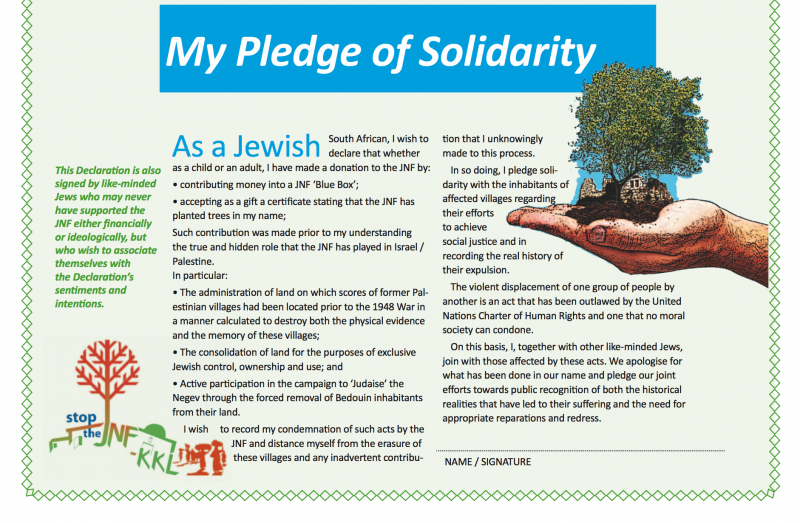StopTheJNF South Africa was formed by a group of Jewish South Africans in 2012. We decided that the work of the Jewish National Fund (JNF) in South Africa had continued unchallenged for too long. In that country, the JNF has built a reputation as an environmental organisation. South Africans have been largely unaware of its role in concealing the remains of Palestinian villages and in the displacement oftheir residents.
Whilst the JNF has represented itself as a ‘green’ initiative, its forests have been important in the Israeli state’s efforts to Judaize the landscape, to clear it of any traces of Palestinian presence and erase the historical and social memory that connects Palestinians to the villages over which the forests are planted. JNF funding has not only contributed to entrenching ethnically exclusive land ownership and the building of Jewish colonial settlements, but also to the destruction of the natural environment. Currently, the JNF continues its work in displacing Palestinian communities of occupied East Jerusalem and the Naqab/Negev. In the occupied West Bank, this is done through its subsidiary, Himanuta. StopTheJNF wants to raise public awareness of this aspect of the JNF.
The JNF was established to acquire lands in historical Palestine and keep this land for exclusively Jewish settlement. It did this by raising donations from Jewish communities around the world, linking its forestation projects to commemorations of life-cycle events for Jewish families (births, circumcisions, bar and bat mitzvahs, marriages, etc.).
In South Africa the JNF continues to mobilise the moral and financial support of many companies, NGO’s, government agencies and members of the Jewish community – with various JNF projects closely linked to local South African environmental projects. Through media and other campaigns, StopTheJNF South Africa has worked to expose the reality behind the JNF’s outward appearance in order to make it more difficult for them to continue their work with impunity.
This current initiative came about after we had seen the documentary Village under the Forest. Co-directed by Mark Kaplan and Heidi Grunebaum, the film tells the story of how Palestinians from Lubya were forcibly expelled and their village destroyed. Years later, largely through funding from the South African Jewish community, the JNF planted the South Africa Forest, part of the larger Lavie Forest covering the remains of Lubya.Many South Africans have given money to the JNF, either through donations to its iconic Blue Box campaigns, or by buying Tree Certificates as gifts for special life-cycle occasions. Donors have often not been aware of how their money is used.
Village under the Forest inspired us to actively address our complicity as South African Jews. We decided to express this symbolically by establishing a solidarity campaign with descendants from Lubyathat highlights the concealment of their village, whose fragmentary remains are extensive. Cactus bushes, a clear sign of depopulated Palestinian villages, grow throughout the forest. Outside the entrance there is a plaque acknowledging South African donors. The following inscription is highlighted: This recreation area was established to enable handicapped access so all may enjoy the forest by friends of the Jewish National Fund and the Women's Zionist Organisation of South Africa.
As South Africans many of whom had been active in the struggle to end apartheid, the film evoked many other associationsin us. The forest was established in the mid-1960s at the height of apartheid’s efforts to segregate ‘race’ groups when massive forced removals of black South Africans to dormitory towns and ‘bantustan’ reserves took place. As Jewish South Africans committed to social justice in our own country, the past and present realities facing the Palestinians displaced from Lubya resonate strongly with us.
Over the past 18 months we have approached hundreds of Jewish South Africans to break the silence on the JNF’s role in human displacement and colonial settlement, to which we have wittingly or unwittingly contributed. We have invited them to sign a Pledge of Solidarity with our Palestinian comrades from Lubya. Today, we hand these pledges to the Palestinian representatives of Lubya – a small step towards what we hope will become a far larger campaign for justice. We are committed to working together to bring about widespread recognition of Palestinian struggles for their rights. We hope that this symbolic act will express our solidarity with all Palestinians from Lubya, including those internally displaced in Israel (the so-called “Present Absentees”), and refugees in the West Bank and Gaza, or throughout Palestinian diaspora. We also wish to demonstrate our solidarity with Palestinians who continue to resist and remain steadfast in the face of ongoing gross human rights violations.


